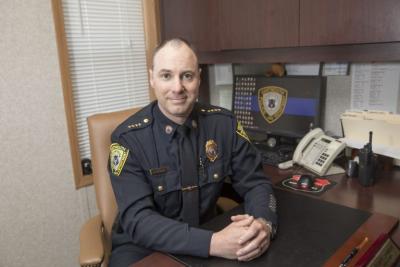Dartmouth Police receive welcome support for mental health calls
When a 911 call comes in, police officers never know where they will be dispatched.
Some calls are familiar: A motor vehicle accident has been reported or a burglar alarm has sounded.
But other calls are more complex. Someone threatens to harm themselves or is otherwise distressed and in crisis.
Dartmouth Police have seen a “sharp increase’’ in calls involving someone in a mental health crisis over the past four to five years, Police Chief Brian Levesque said.
Dealing with these calls “has become a huge part of our job,’’ he said.
The police have always done their best to handle these situations, the chief said, but “we certainly don’t specialize in them.’’
So about 18 months ago, the department decided to reach out to people who regularly work with people in crisis.
Dartmouth Police have teamed up with the Emergency Services Program’s Mobile Crisis Team of Child & Family Services in New Bedford to offer support and assistance on calls involving a mental health crisis.
“If we can call out a professional, that’s the preferred response,’’ he said. “We’re trying to focus on de-escalation, getting them to calm down — it’s a huge benefit to be able to partner with them.’’
Representatives from the organization often come out to scenes, or, when that is not possible, are available by phone. They can help de-escalate situations or offer advice and support to officers on how to best handle what they are facing, Levesque said.
When the partnership began, representatives of the emergency services program provided training to officers on some of the situations they might face.
They are now on call 24 hours a day, seven days a week, to provide assistance.
Their presence can provide a calming, and in some cases, familiar presence to someone who is in crisis, Levesque said.
“The minute someone is there who is not a police officer’’ the situation is “viewed differently,’’ he said. “That changes the whole tone.”
Seeing that police are willing to bring in a trained mental health specialist can also help the person in crisis recognize that police care, Leveque said, and “want to help and bring someone to the scene.’’
Police have learned that “time and distance’’ can be important tools in mental health situations, Levesque said. When the situation allows, he said, taking time to work with a person in crisis, rather than rushing to a resolution, and providing a healthy distance can result in a “peaceful resolution.’’
Working with the mental health professional can also offer additional on-the-job training for officers, Levesque said. “They can watch how the person interacts’’ with the person in crisis, Levesque said, and learn from the encounter.
With the world opening up after Covid, the department is looking to expand the program, the chief said. They hope to have a specialist ride along with officers during hours determined to see the most calls involving mental health issues, Levesque said.
“It’s a huge benefit to be able to partner with them,’’ he said.














